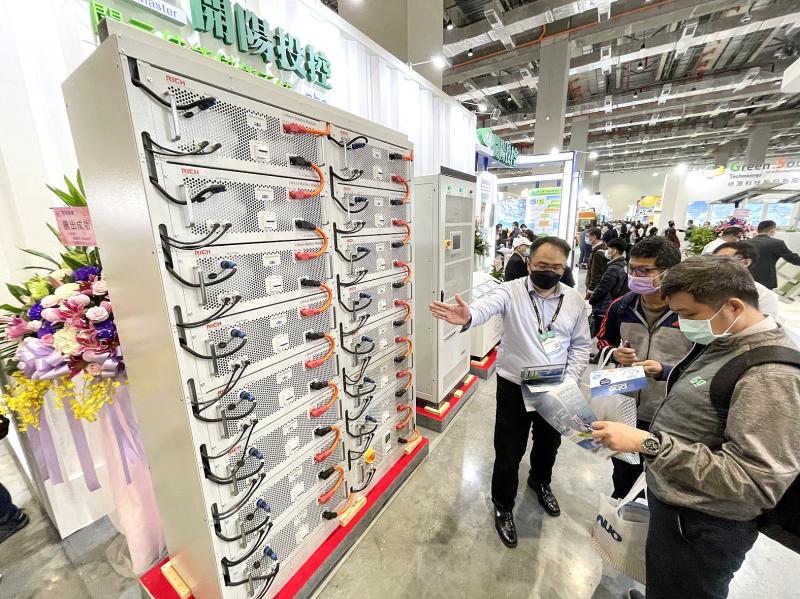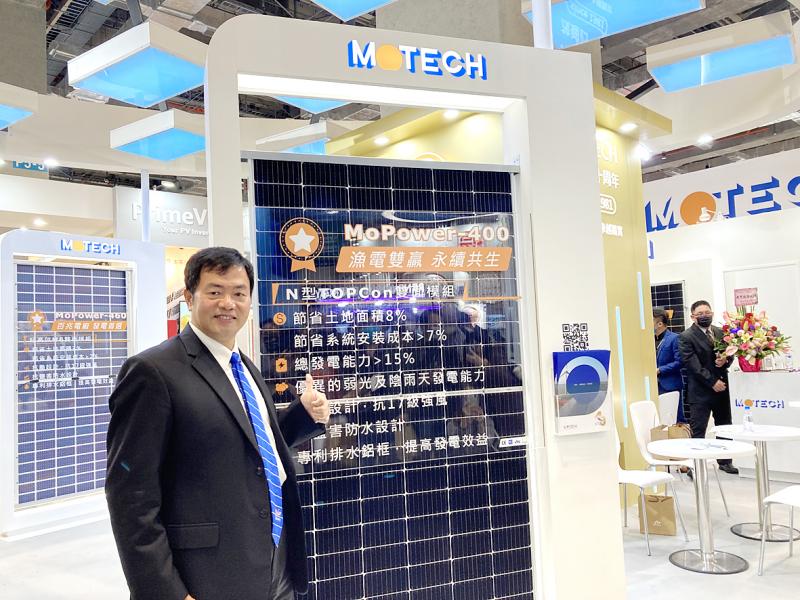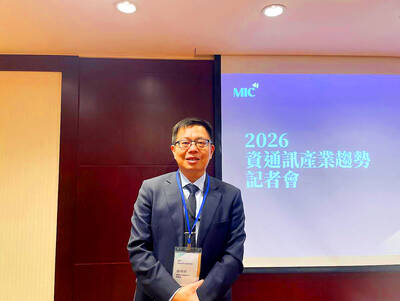Solar cell and module supplier TSEC Corp (元晶) yesterday gave a robust outlook for this quarter, with an order backlog that would take at least two quarters to digest.
The company, based in New Taipei City’s Sindian District (新店), said it has started taking orders for delivery in the third quarter of next year, as its production lines are fully booked.
This should help TSEC swing back to the black this quarter and help offset losses of NT$198.69 million (US$7.16 million) in the first three quarters, company spokesman Henry Chiang (江郅豪) told a media briefing in Taipei.

Photo: CNA
“Both shipments and prices are on the rise in the fourth quarter. We have a chance to eke out a profit for the full year,” Chiang said. “Revenue this month should remain at the same high level as that of November.”
TSEC expects the improvement in profitability to extend into next year, thanks to falling raw material costs and a surge in solar module demand in the domestic market.
The company expects solar panel installations in the nation to climb to more than 11 gigawatts (GW) next year, suggesting an increase of more than 3GW.

Photo: Lisa Wang, Taipei Times
“There is a lot of catch-up to do next year, as installations this year have been slow due to the COVID-19 outbreak and raw material shortages,” Chiang said.
By the end of this year, Taiwan’s solar energy installation is estimated to reach 7GW, less than half of the government’s 20GW target by 2025.
To satisfy customer demand next year, TSEC is investing NT$1 billion to build a new solar cell line and solar module line next year to make larger solar modules, Chiang said.

Photo: Lisa Wang, Taipei Times
That would increase its solar cell and module capacity to 1.5GW next year from 1GW this year, after new M6 (166mm2) and M10 (182mm2) solar cells enter production next year, he said.
Solar cell and module maker Motech Industries Inc (茂迪) shared TSEC’s optimistic view.
“There will be explosive growth in the first and second quarters next year. The momentum would to carry into the second half,” Motech president Fred Yeh (葉正賢) told reporters on the sidelines of the annual Energy Taiwan trade show in Taipei.
“Customers have to wait for six months to receive their products,” Yeh said.
The company plans to roll out new-generation tunnel oxide passivated contact (TOPCon) cells that can produce more solar power in the third quarter next year, after current-generation TOPCon gains traction.
Motech, based in Tainan, plans to expand its TOPCon solar cell capacity to 200 megawatts (MW) next year, up from 15MW this year.

CHIP RACE: Three years of overbroad export controls drove foreign competitors to pursue their own AI chips, and ‘cost US taxpayers billions of dollars,’ Nvidia said China has figured out the US strategy for allowing it to buy Nvidia Corp’s H200s and is rejecting the artificial intelligence (AI) chip in favor of domestically developed semiconductors, White House AI adviser David Sacks said, citing news reports. US President Donald Trump on Monday said that he would allow shipments of Nvidia’s H200 chips to China, part of an administration effort backed by Sacks to challenge Chinese tech champions such as Huawei Technologies Co (華為) by bringing US competition to their home market. On Friday, Sacks signaled that he was uncertain about whether that approach would work. “They’re rejecting our chips,” Sacks

Taiwan’s long-term economic competitiveness will hinge not only on national champions like Taiwan Semiconductor Manufacturing Co. (TSMC, 台積電) but also on the widespread adoption of artificial intelligence (AI) and other emerging technologies, a US-based scholar has said. At a lecture in Taipei on Tuesday, Jeffrey Ding, assistant professor of political science at the George Washington University and author of "Technology and the Rise of Great Powers," argued that historical experience shows that general-purpose technologies (GPTs) — such as electricity, computers and now AI — shape long-term economic advantages through their diffusion across the broader economy. "What really matters is not who pioneers

BUBBLE? Only a handful of companies are seeing rapid revenue growth and higher valuations, and it is not enough to call the AI trend a transformation, an analyst said Artificial intelligence (AI) is entering a more challenging phase next year as companies move beyond experimentation and begin demanding clear financial returns from a technology that has delivered big gains to only a small group of early adopters, PricewaterhouseCoopers (PwC) Taiwan said yesterday. Most organizations have been able to justify AI investments through cost recovery or modest efficiency gains, but few have achieved meaningful revenue growth or long-term competitive advantage, the consultancy said in its 2026 AI Business Predictions report. This growing performance gap is forcing executives to reconsider how AI is deployed across their organizations, it said. “Many companies

COST PRESSURE: Global PC brands such as HP Inc are expected to cope with the situation by either raising prices or downgrading their products, a researcher said Global PC shipments are expected to grow by a mere 0.3 percent to about 180 million units next year, as a surge in memory prices has added cost pressure on manufacturers, the Market Intelligence and Consulting Institute (MIC) said at a news conference in Taipei yesterday. As major memorychip suppliers such as Samsung Electronics Co and Micron Technology Inc shift resources and production capacity toward high-bandwidth memory, which is used primarily in servers and offers higher margins, the supply of low-power DRAM used in PCs and smartphones has been squeezed, tightening supply-demand conditions and pushing up prices, MIC ICT Industry Research